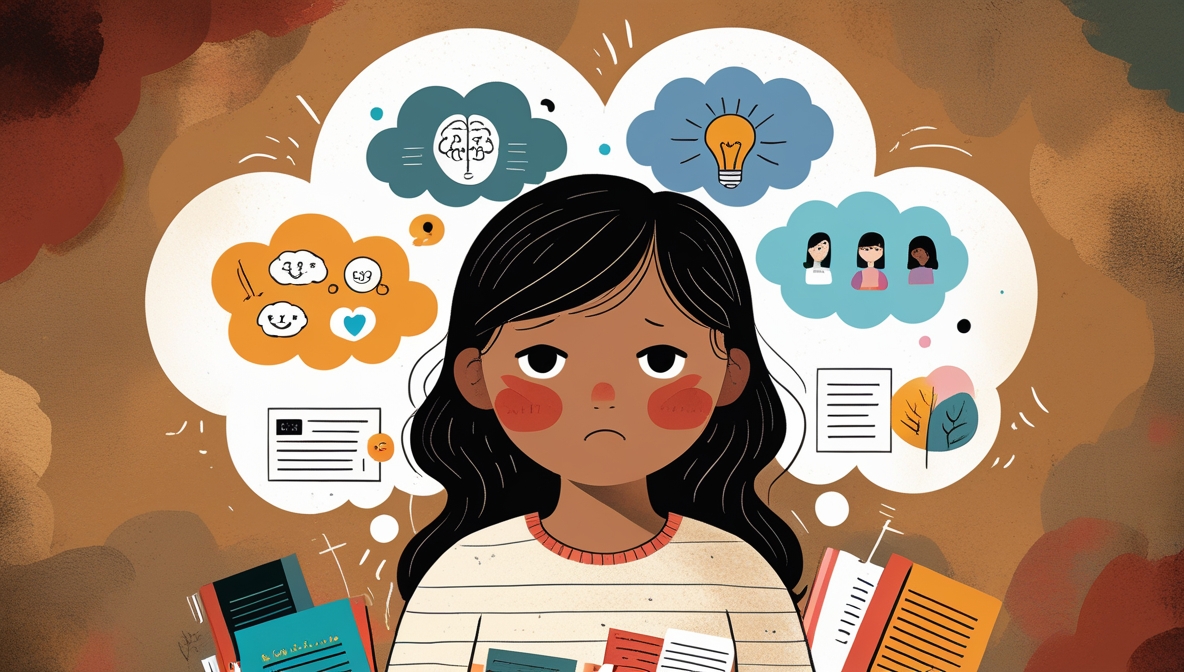Psychological Concepts Used in Child Obesity: Understanding the Mental Impact and Solutions

Childhood obesity isn’t just about physical health—it’s closely tied to mental and emotional well-being. Psychological factors like low self-esteem, anxiety, and emotional eating often play a major role. Understanding these connections can help parents, caregivers, and professionals create solutions that address the root causes, not just the symptoms. By exploring these psychological concepts, we can better support children’s health—inside and out.
Key Takeaways
The psychological concepts tied to childhood obesity reveal the intricate links between mental health and physical well-being. These findings underscore the importance of addressing emotional and social factors when tackling childhood obesity, making it a multifaceted issue deserving holistic solutions. Here’s what stands out:
Emotional Eating: A Deep-Rooted Coping Mechanism
Children dealing with stress, anxiety, or low self-esteem often turn to food for comfort. Emotional eating isn’t just about hunger but filling a void caused by psychological distress. Consuming high-calorie comfort foods can temporarily boost feelings of happiness, but over time, this coping mechanism contributes to obesity and worsens the very emotions it’s meant to ease. Learn more about this connection.
Social Stigma and Bullying’s Role in Escalating Child Obesity
Obese children often face stigma and bullying, whether in school, social environments, or even within family settings. This consistent negative attention can harm their self-esteem and create a vicious cycle: low self-worth leading to overeating and more weight gain. Read about the emotional toll of stigma.
Psychological Disorders Comorbid with Obesity
The relationship between obesity and mental health often includes common comorbid disorders such as depression, anxiety, and attention deficit hyperactivity disorder (ADHD). These conditions may lead to unhealthy eating patterns, lack of physical activity, and increased weight gain over time. Explore research on psychological comorbidities.
Family Dynamics and Impact on Eating Behaviors
Family environments play a critical role in shaping a child’s psychological and physical habits. Children who are ridiculed at home for their weight may internalize these experiences, feeling unworthy and turning to food for solace. Conversely, supportive family structures can help mitigate these effects and encourage healthier behaviors. Dive into familial perspectives here.
Cognitive Perspective: Distorted Self-Image
Obese children often struggle with their self-concept and body image, which can skew their perception of themselves and their abilities. This distorted self-image can inhibit their social interactions and academic performance, compounding their mental health struggles. Understand more about cognitive effects.
Each of these key takeaways highlights the psychological concepts tied to childhood obesity, emphasizing the need to address mental and emotional factors alongside physical health solutions.

Photo by Mikhail Nilov
The Psychological Landscape of Child Obesity
Childhood obesity is more than physical health. It’s deeply intertwined with mental processes, emotions, and social pressures. By understanding psychological factors like self-esteem, emotional regulation, and social dynamics, we can approach this issue more holistically.
Self-Esteem and Body Image
Childhood obesity often impacts self-esteem and body image, creating a feedback loop that worsens emotional well-being. Obese children may internalize feelings of inadequacy, especially when faced with societal ideals that label them unfavorably.
- Distorted Body Image: Many children with obesity struggle to see their bodies accurately. They might feel “too big” even when progress is made towards a healthier weight. This distortion can prevent them from celebrating small victories or sticking to positive habits.
- Emotional Toll: A study highlights that low self-esteem in obese children correlates with sadness and feelings of loneliness. These emotions become hurdles, making it harder for healthy patterns to emerge. Read more about self-esteem’s role in child obesity.
Parents and caregivers play a role here. Focusing on strengths rather than appearances can help children gain confidence, changing the narrative to one of empowerment and care.
Emotional Regulation
Emotions play a central role in eating habits. For many children, food isn’t just sustenance—it’s comfort during tough times. Overeating can stem from a biological response to stress, paired with ineffective emotional regulation skills.
- Stress-Fueled Eating: Stress hormones, particularly cortisol, can increase cravings for high-calorie, sugary foods, further fueling weight gain.
- Lack of Tools: Children who don’t learn to manage their emotions may turn to food as a quick-fix coping mechanism. They often rely on patterns that soothe now but harm later.
Emotion regulation training has shown promise in breaking this cycle. Studies suggest that teaching these skills alongside dietary changes significantly improves long-term outcomes. See how emotional regulation influences child obesity.
Peer Influence and Social Comparisons
Children are profoundly shaped by their social environments. Friend groups, peer interactions, and social norms affect how kids perceive themselves, which can influence eating behaviors.
- Negative Comparisons: Overweight children are often subjected to teasing and exclusion. Such experiences create social isolation, making food a companion in their loneliness.
- Shared Behaviors: On the flip side, children may adopt the eating habits of their peers for better or worse. If a peer group normalizes unhealthy snacks or fast food, those habits can spread quickly within the circle.
Studies reveal that fostering supportive peer relationships helps build resilience, making children less susceptible to internalizing harmful comparisons. Discover the role of peers in childhood obesity.

Photo by Moe Magners
Understanding psychological concepts like self-esteem, emotional regulation, and peer influence allows for a compassionate and informed approach to combating childhood obesity. By addressing these mental and emotional drivers, we can create meaningful change.
Psychological Comorbidities Associated with Childhood Obesity
Childhood obesity is not merely a matter of physical health—its psychological impact can be just as profound. Obese children are more susceptible to mental health struggles, with a mix of emotional, behavioral, and cognitive disorders acting as co-contributors. From anxiety to binge eating, recognizing these connections is key to supporting children holistically.
Anxiety and Depression

Photo by Kaboompics.com
Children with obesity often experience feelings of rejection and inadequacy, stemming from societal and peer pressure. Over time, this can evolve into anxiety and depression, two of the most frequently noted psychological comorbidities. For many, the world feels like an obstacle course full of judgment, where even everyday tasks can feel isolating.
- Social Anxiety: Obese children often avoid public activities due to fear of being ridiculed or judged.
- Depression Symptoms: Research shows they experience long bouts of sadness, fatigue, and low energy levels, which only deepens their challenges. Learn more about common mental health comorbidities.
Unlike a scraped knee, these emotional wounds aren’t easy to spot but leave scars that often linger into adulthood. By addressing these mental health concerns openly, caregivers and professionals can create a sense of security and promote healthier coping strategies.
Binge Eating Disorder
A lesser-discussed yet prevalent issue among obese children is binge eating disorder (BED). This problem isn’t simply a “love for food”; it’s tied to deeper emotional triggers such as stress, shame, and even past trauma.
BED is characterized by episodes of consuming large quantities of food quickly, often in private. This behavior generally comes with feelings of guilt or loss of control. Sound familiar? Many children struggling with obesity see food as both a friend and enemy—seeking solace in it while battling its consequences.
Psychological Triggers of BED:
- Low Self-Worth: Feelings of inadequacy push kids towards immediate, albeit temporary, relief through food.
- Stress Responses: Triggered by social rejection, family turmoil, or academic pressure.
- Cognitive Distortions: Believing “I’ve already failed” leads to cycles of overeating.
A study revealed that addressing the emotional root of BED in therapy significantly reduces its occurrence over time. Explore more about BED in obese children.
Every binge is a cry for stability, attention, or understanding. Offering these children the tools to regulate emotions can help break free from unhealthy eating behaviors.
Interventions Addressing Psychological Aspects of Obesity
When it comes to tackling childhood obesity, addressing the psychological factors is just as important as physical interventions. Two notable approaches, Cognitive Behavioral Therapy (CBT) and family-based interventions, are proving to be effective tools in understanding and mitigating the mental barriers children face in their weight management journeys.
Cognitive Behavioral Therapy (CBT): Addressing Negative Thought Patterns
Cognitive Behavioral Therapy (CBT) is a structured, evidence-based approach that helps children identify and change harmful thought patterns influencing their behaviors around food and activity. Often, children coping with obesity develop negative self-talk, such as associating setbacks with personal failure. These thoughts can ignite a cycle of low self-esteem and poor eating habits.
- Rewiring Thought Patterns: CBT focuses on helping children recognize and challenge irrational thoughts like “I’ll always be overweight” or “I can’t control my eating.” By replacing these with actionable, positive affirmations, they begin cultivating healthier self-perceptions.
- Stress Management: Often, emotional eating stems from unresolved stress. CBT introduces coping mechanisms—not food—for managing emotions like journaling or breathing exercises.
- Behavioral Awareness: CBT encourages kids to monitor their eating patterns actively. For instance, keeping a food journal is one way for them to spot triggers driving impulsive eating.
Research underscores CBT’s success in reducing obesity while improving health-related quality of life for children. Caregivers can learn more about CBT’s influence on weight management through this resource: CBT is Effective for Childhood Obesity.
Family-Based Interventions: Strengthening the Role of Family Dynamics
Family dynamics heavily influence a child’s health behaviors. Family-based interventions, which actively involve parents and caregivers, aim to create a supportive network that enables lifestyle changes.
- Collaborative Goal-Setting: These programs often involve setting realistic family health goals, such as cooking balanced meals together or scheduling regular outdoor walks.
- Positive Reinforcement: Encouraging productive behavior over criticizing failures fosters motivation in children. Parents learn to celebrate successes like opting for a healthy snack instead of a reward system tied to food.
- Role Modeling: Parents’ habits strongly influence children. Through interventions, caregivers are taught to be role models by practicing the same healthy behaviors they promote to their kids.
Studies consistently highlight how family-based strategies produce meaningful weight loss and long-term behavioral changes. Explore the evidence of family-based treatment outcomes here: Family-Based Interventions Targeting Childhood Obesity.
Both CBT and family-based interventions recognize that obesity isn’t just about calories—it’s about context. By addressing the mental and emotional roots of unhealthy habits, these interventions pave the way for lasting well-being in children.

Photo by Romario Art
The Role of Education and Awareness
Education and awareness are powerful tools in the fight against childhood obesity. By fostering a supportive environment, children learn to adopt healthier behaviors from a young age. Focusing on psychological factors like self-esteem, emotional responses, and body image, we can help break the cycle of unhealthy habits.
Promoting Positive Body Image
A positive body image sets the foundation for mental and physical health. Children often internalize societal messages about “ideal” appearances, which can create unrealistic expectations and self-criticism. Educating kids on valuing their bodies for their functionality and uniqueness can make all the difference.
Here are some actionable strategies to promote healthy body image in children:
- Use Positive Language: Avoid speaking negatively about weight, food, or appearances in front of kids. Focus on talking about how the body works and its amazing abilities.
- Model Healthy Behaviors: Children mimic the adults around them. Show them how to make balanced food choices and maintain an active lifestyle without emphasizing weight loss.
- Limit Social Media Exposure: Social media often glamorizes unrealistic body standards. Encourage screen time with purpose and focus on apps or shows that emphasize diversity and positivity.
- Celebrate Strengths Beyond Appearance: Praise children for their creativity, kindness, or effort, instead of their looks. This shifts their focus from appearance to abilities.
Promoting body positivity isn’t just about fostering self-esteem—it’s about teaching children resilience against a world that often judges by appearances. Learn more about supporting a positive body image in children.

Photo by Leeloo The First
Encouraging Healthy Emotional Responses
Many children turn to food as a way to cope with emotions like stress, sadness, or boredom. Teaching them healthier methods to manage their feelings can reduce emotional eating and lead to better self-regulation.
Here’s how parents and caregivers can help:
- Encourage Open Dialogue: Teach children that it’s okay to feel upset or angry and provide a safe space for conversation. Talking about feelings can prevent them from bottling up emotions.
- Introduce Alternative Coping Mechanisms: Suggest activities like drawing, playing, or listening to music as outlets for stress or frustration. Physical movement, such as walking or stretching, can also help release tension.
- Teach Mindfulness: Practicing mindfulness techniques like deep breathing or meditation allows children to become more aware of their emotions and respond thoughtfully rather than impulsively.
- Use Emotion Vocabulary: Introduce words to describe different feelings. When kids can name their emotions, they’re better equipped to manage and express them.
Helping kids develop emotional resilience equips them to handle life’s challenges without relying on food as comfort. Discover the importance of emotional health for children.
These educational practices and awareness strategies create an empowering atmosphere for children. By promoting body positivity and emotional health, we’re shaping a future generation that values mental and physical well-being.
Conclusion
Understanding the psychological concepts behind childhood obesity is essential for effective prevention and intervention. Factors like emotional eating, low self-esteem, and social pressures often drive unhealthy behaviors, intertwining mental health with physical outcomes. Addressing these aspects creates a pathway for lasting change.
Parents, caregivers, and educators play pivotal roles in fostering positive body image, emotional regulation, and resilience. By focusing on mental well-being as much as physical health, we can build solutions tailored to children’s unique needs.
Small changes in awareness and support can make a big difference. Let this serve as a call to action: prioritize both the minds and bodies of children to combat obesity comprehensively.





